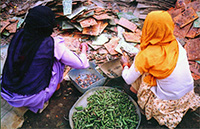Proposed waste law to officially turn India into global waste destination
Draft promotes waste trade over health and environment
BAN & Toxics Link Press Release
 |
 |
 |
 |
| |
 |
|
| |
Indian women plucking chips off of circuit boards. Proposed Indian legislation will open the floodgates to importation of hazardous electronic waste from around the world. |
|
 |
 |
 |
|
| |
14 November 2007 (New Delhi) – Through a jugglery of words in the draft legislation on waste, the Indian Government may pave the way for officially opening floodgates for the dumping of world's hazardous waste in the name of recycling and unleash unprecedented havoc on India's environment and health of its citizens, environmentalists have warned.
This was stated by leading global experts and civil society leaders who have been working on waste issues, in the wake of the recently publicised Draft Hazardous Materials (Management, Handling and Transboundary Movement) Rules, 2007.
Environmentalists say that the newly drafted hazardous waste management law for India seeks to undo established, science-based definitions of waste and consider waste that is being recycled somehow less hazardous than the waste being landfilled in order to curry favor with hazardous scrapping industries.
"Through a not-so-subtle mangling of international definitions for "waste", "disposal" and "safe recycling" the Indian Government has designed a veritable global waste funnel that will ensure that the world's waste will surge to our shores," said Ravi Agarwal, director of Toxics Link.
"Ironically this is all being done in the name of recycling," he quipped.
The Draft Hazardous Materials (Management, Handling and Transboundary Movement) Rules, 2007, which is now in its final stage, proposes redefining "hazardous waste" as "hazardous material". Such completely altered definitions are contrary to the international rules of the Basel Convention, which India is obliged to uphold.
"It is not only inappropriate but its illegal for India to pretend to implement the Basel Convention but utilise definitions that turn the intent of the treaty on its head,” said Jim Puckett, Coordinator of the international Basel Action Network (BAN), the Convention's watchdog organisation.
Among examples of departures from the Basel Convention and international law are the following:
- India has decided that transit states do not have to receive prior informed consent for all shipments of hazardous waste.
- India has decided that dumping in rivers, oceans, and lakes, or burning waste somehow does not constitute disposal and therefore that which is dumped in aquatic environments, or burned, is not waste.
- The international definition of "environmentally sound management" has been ignored in favor of a new definition of "safe for recycling" that states that as long as a material contains less than 60% contamination by a hazardous constituent, then it’s safe!
- India has exempted bio-medical wastes and municipal wastes from this law yet these are meant to be covered under Basel.
- India appears to allow dioxin imports for disposal but not for recycling.
- Waste asbestos imports are banned unless they are contaminating other substances (e.g. old ships).
- Fails to implement the Ban Amendment forbidding all imports of hazardous waste from developed countries.
- Fails to recognize it is illegal to trade in waste with non-Parties of the Basel Convention such as the United States.
According to the environmental groups the draft law also changes substantially the existing hazardous waste Management and Recycling Rules, and flies in the face of Supreme Court judgments. Further it is contrary to India's constitution because (provision on the State's obligation to protect people's right to health and environment), instead of an environmental law being protective of human health and the environment, this is trade centric for hazardous waste.
This assumes significance when India is currently negotiating various economic partnerships. For example India is presently negotiating with Japan on what it calls a new-age Economic Partnership Agreement (EPA).
Japanese EPAs with other Asian countries consistently include toxic wastes for trade liberalization, and if wastes are considered goods it is feared they will be freely traded and India will be the recipient of Japanese waste.
Finally the environmentalists denounced the process by which this law has reached the final stages without public scrutiny.
"A major amendment of a key environmental legislation has been proposed with no discussion or consultation with civil society. Civil Society and the Judiciary have been deeply involved in this issue for over a decade-and-a-half, and ignoring their concerns is demonstrative of the manner in which this government has become representative only of a handful of influential industries," said Mr. Agarwal.
"While India still does not have capacity to deal with its internally generated wastes, it is opening up its borders for imported hazardous and electronic waste, clearly showing the distorted priorities of the Government," he added.
Note for editors: BAN and Toxics Link have jointly prepared a detailed set of comments highlighting these concerns to the Ministry of Environment and Forests. The Draft will be open for comments and suggestions till 28th of November 2007.
For more please visit: www.toxicslink.org and www.ban.org
Contact:
Ravi Agarwal 0981007355, Parvinder Singh 9811703798
Jim Puckett, of Basel Action Network, in Seattle, +1.206.652.5555, email: jpuckett@ban.org.
FAIR USE NOTICE. This document contains copyrighted material whose use has not been specifically authorized by the copyright owner. The Basel Action Network is making this article available in our efforts to advance understanding of ecological sustainability and environmental justice issues. We believe that this constitutes a 'fair use' of the copyrighted material as provided for in section 107 of the US Copyright Law. If you wish to use this copyrighted material for purposes of your own that go beyond 'fair use', you must obtain permission from the copyright owner.
More News
|